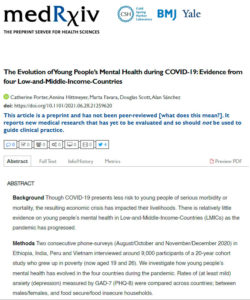The Evolution of Young People’s Mental Health during COVID-19: Evidence from four Low-and-Middle-Income-Countries
| Año | : | 2021 |
|---|---|---|
| Autor/es | : | Catherine Porter, Marta Favara, Alan Sánchez, Douglas Scott |
| Área/s | : | Salud y nutrición |
Porter, Catherine; Annina Hittmeyer, Marta Favara, Douglas Scott, Alan Sánchez (2021). The Evolution of Young People’s Mental Health during COVID-19: Evidence from four Low-and-Middle-Income-Countries
Though COVID-19 presents less risk to young people of serious morbidity or mortality, the resulting economic crisis has impacted their livelihoods. There is relatively little evidence on young people’s mental health in Low-and-Middle-Income-Countries (LMICs) as the pandemic has progressed.
Two consecutive phone-surveys (August/October and November/December 2020) in Ethiopia, India, Peru and Vietnam interviewed around 9,000 participants of a 20-year cohort study who grew up in poverty (now aged 19 and 26). Authors investigate how young people’s mental health has evolved in the four countries during the pandemic. Rates of (at least mild) anxiety (depression) measured by GAD-7 (PHQ-8) were compared across countries; between males/females, and food secure/food insecure households.
Overall, researchers find that rates of at least mild anxiety (depression) significantly decreased in all countries but Ethiopia as infection rates fell. However, young people in food insecure households report high rates of anxiety and depression and have not shown consistent improvements. Food insecure households are poorer, and have significantly more children (p<0.05) except in Ethiopia.
As for the conclusions, food insecurity has increased during the COVID-19 pandemic and is negatively associated with young people’s mental health. Urgent support is needed for the most vulnerable.






